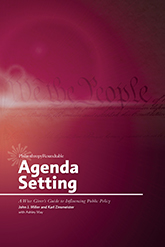Publication Date: March, 2015
... one must create policies that make it possible for people to practice their faith freely within society. ...
... Learn how funders and grantees can help fill gaps, keep people informed as trusted community partners, and share ...
... and growing need in our communities. The sheer number of people stricken with COVID-19, heartbreak of families and ...
... challenges -- and balancing them with employment needs. People who’ve lost their jobs need to know how to find the ... sector responding to the needs of nonprofits and the people they serve? Many funders have...
At a time when nonprofits and philanthropy were needed the most, the pandemic forced most social sector organizations to go fully or partially remote. As we enter 2021, it seems that many organizations will continue to operate virtually for some time...
... Foundation. "It's estimated that up to 34 million people who rent are at risk of losing their homes when ...
... Jersey’s arts community has adapted to continue reaching people throughout the state and across the globe at a time ...
... in support for current and new grantee partners led by people of color or directly serving communities of color. ...
... communities, and we hope these grants will help young people rebound from some of that learning loss and re-engage ...
... nonprofit organizations working to make a direct impact on people’s lives throughout the state, 66 of which, totaling ...
In New Jersey, an estimated 762,530 people are facing hunger, according to Feeding America. As ...
... school or employment. The project will both help the young people gain a foothold to promising career paths, and help ...
... and respond to the real-time issues and crises facing people across the State of New Jersey. These grants represent ...
... Newark, Paterson, and Trenton, offering services for young people returning from incarceration. Other Imagine a New Way ...
... that aim to connect critical services to residents, young people, women, women with children and families. The project ...
... that provide a wide variety of ac tivities for young people, including arts instruction, academic enrichment, ...
... healthy, thriving, and civically engaged New Jersey where people of all places, racial identities, socio-economic ...
... threats to New Jersey’s nonprofit organizations and the people and communities they serve. Cost : Free for CNJG ...
Publication Date: October, 2015
What comes after “strategic...?” If you said, “planning,” you’re not alone. And for many leaders of community foundations, especially small ones who don’t have the time or money for a big process, anxiety is the feeling that follows. If that’s the...
Publication Date: June, 2022
The Council of New Jersey Grantmakers’ 2023 – 2027 Strategic Plan reimagines the future for CNJG. As a result of the extensive strategy development process, the plan includes a renewed vision, mission, core values, and goals. The work is informed by...

